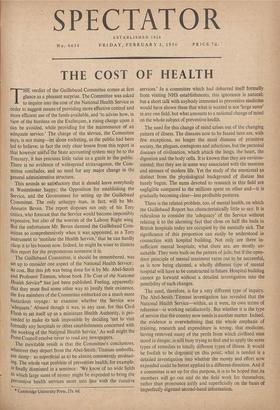THE COST OF HEALTH
THE verdict of the Guillebaud Committee comes at first glance as a pleasant surprise. The Committee was asked to inquire into the cost of the National Health Service in order to suggest means of providing more effective control and more efficient use of the funds available, and 'to advise how, in view of the burdens on the Exchequer, a rising charge upon it can be avoided, while providing for the maintenance of an adequate service.' The charge of the service, the Committee says, is not rising—let alone rocketing, as the public had been led to believe; in fact the only clear lesson from this report is that however useful the State accounting system may be to the Treasury, it has precious little value as a guide to the public. There is no evidence of widespread extravagance, the Com- mittee concludes, and no need for any major change in the general administrative structure.
This sounds so satisfactory that it should leave everybody at Westminster happy; the Opposition for establishing the Service, and the Government for setting up the Guillebaud Committee. The only unhappy man, in fact, will be Mr. Aneurin Bevan. The report disposes not only of his Tory critics, who forecast that the Service would become impossibly expensive, but also of the worries of the Labour Right wing. But the unfortunate Mr. Bevan damned the Guillebaud Com- mittee so comprehensively when it was appointed, as a Tory Instrument to 'mutilate the Health Service,' that he can hardly clasp it to his bosom now. Indeed, he might be wiser to dismiss this report for the preposterous nonsense it is.
The Guillebaud Committee, it should be remembered, was set up, to consider one aspect of the National Health Service : its cost. But this job was being done for it by Mr. Abel-Smith and Professor Titmuss, whose book The Cost of the National Health Service* has just been published. Feeling, apparently; that they must find some other way to justify their existence, the five members of the Committee embarked on a much more hazardous voyage : to examine whether the Service was 'adequate.' Absurd though it was, in any case, for this Civil slush to set itself up as a miniature Health Authority, it pro- ceeded to make its task impossible by deciding 'not to visit formally any hospitals or other establishments concerned with the working of the National Health Service.' As well might the Press Council ,resolve never to read any newspapers.
The inevitable result is that the Committee's conclusions, wherever they depart from the Abel-Smith/ Titmuss umbrella, are damp : so superficial as to be almost consistently mislead- ing. The whole vast problem of preventive health, for example, Is finally dismissed in a sentence : 'We know of no wide fields in which large sums of money might be expended to bring the preventive health services more into line with the curative
* Cambridge University Press, 27s. 6d.
services.' In a committee which had debarred itself formally from visiting NHS establishments, this ignorance is natural; but a short talk with anybody interested in preventive medicine would have shown them that what is wanted is not 'large sums' in any one field, but what amounts to a national change of'mind on the whole subject of preventive health.
The need for this change of mind arises out of the changing pattern of illness. The diseases now to be feared here are, with few exceptions, no longer the mass diseases of primitive society, the plagues, contagions and infections, but the personal diseases of civilisation, which attack the lungs, the heart, the digestion and the body cells. It is known that they are environ- mental; that they are in some way associated with the tensions and stresses of modern life. Yet the study of the emotional as distinct from the physiological background of disease has barely begun. The sums devoted to research in this field are negligible compared to the millions spent on other and—it is gradually becoming clear—less profitable pastures.
There is the related problem, too, of mental health, on which the Guillebaud Report has characteristically little to say. It is ridiculous to consider the 'adequacy' of the Service without relating it to the alarming fact that close on half the beds in British hospitals today are occupied by the mentally sick. The significance of this proportion can easily be understood in connection with hospital building. Not only are there in- sufficient mental hospitals; what there are, are mostly un- suitable. They were built on the pattern of jails; but if the open- door principle of mental treatment turns out to be successful, as is now being claimed, a wholly different type of mental hospital will have to be constructed in future. Hospital building cannot go forward without a detailed investigation into the possibility of such changes.
The need, therefore, is for a very different type of inquiry. The Abel-Smith/ Titmuss investigation has revealed that the National Health Service—within, as it were, its own terms of reference—is working satisfactorily. But whether it is the type of service that the country now needs is another matter. Indeed, the evidence is overwhelming that the whole emphasis of training, research and expenditure is wrong; that medicine, having removed many of the perils from which civilised man stood in danger, is still busy trying to find and to apply the same types of remedies to totally different types of illness. It would be foolish to be dogmatic on this point; what is needed is a detailed investigation into whether the money and effort now expended could be better applied in a different direction. And if a committee is set up for this purpose, it is to be hoped that its members will go out and do the field work for themselves, rather than pronounce airily and superficially on the basis of imperfectly digested second-hand information.


































 Previous page
Previous page